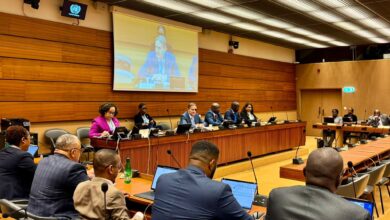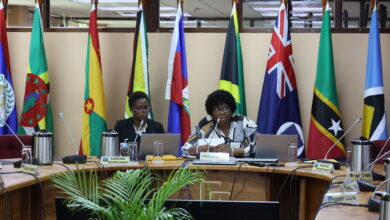(CARICOM Secretariat, Turkeyen, Greater Georgetown, Guyana) On behalf of the Caribbean Community (CARICOM) Secretariat, I wish to add my words of welcome to all of you present at this landmark occasion, the inaugural meeting of the Executive Board of the Caribbean Public Health Agency (CARPHA).
After several years of assessments, debates, and resolutions based on numerous feasibility studies and reports, the moment has arrived when this Board will actual preside over the virtual ‘beginning of the future’ of CARPHA (to borrow a phrased coined by Winston Churchill)
This Board is charged with the responsibility for charting the directions of CARPHA by approving its strategic plan, appointments to staff positions and the technical advisory committees; by devising mechanisms for the prompt exchange of information among its members and between the Board and the various stakeholders; by promoting cooperation in education and public awareness; by supervising the mobilization and disbursement of resources and all other fiduciary matters related to accountability and good governance.
In addition, the Board is responsible for overseeing the agreements between the CARPHA Directorate and external agencies as well as to monitor the implementation of the transition of the five Regional Health Institutions (RHIs) to a consolidated CARPHA. This is indeed an exacting range of tasks, compounded by the fact that there are great expectations about the outcomes from this Agency.
I feel very confident that under the able chairmanship of Dr the Honourable Leslie Ramsammy, the longest serving CARICOM Minister of Health, and with the commitment of the other members, this Executive Board will respond to the challenges and emerge with flying colours.
More than most other Executive Boards, you will no doubt be confronted with actually establishing the framework for your operations, as this is the first of its kind for the Community, where formerly independent institutions are being consolidated under one governance arrangement.
There is no model, no blueprint, no precedents and no conventions on which to chart your course. Yet there is a well articulated vision and mission for CARPHA, an agreed decision-making structure and firm guidelines in the articles in the Inter-Governmental Agreement establishing CARPHA
Our Heads of Governments have endorsed the establishment of CARPHA, based on a series of assumptions. Among them is the fact that, as a consolidated agency, it would provide services beyond the scope and affordability of any nationally-driven institution. As an entity that combines the expertise formerly located in five separate systems, it is reasonable to believe that its potential to become a centre of excellence is assured.
Its contribution to the economic well being of the Community, too, is predicated on the close links of its programmatic agenda to the elements of health promotion, the strengthening of public health leadership, the support for policy research and programmatic development of its overall public health agenda to respond to the needs of critical economic sectors, like tourism, transportation, agriculture and industry.
CARPHA as presently conceived will be an asset to our Region, providing, as it will, a laboratory and surveillance system that is highly responsive to natural disasters and for the innovation in information, education and communications techniques envisaged to connect the national public health priorities in a coherent and constructive manner.
As the Community endeavours to consolidate its integration process, CARPHA has a vital role to play in demonstrating the value of health to development, and increasing the benefits of ‘health for all’ by contributing toward the reduction of health inequities. CARPHA could also play a strategic role in the fight against Chronic Non-Communicable Diseases (NCDs) which received global attention last week at the United Nations High Level Meeting in New York.
These are some of the fundamental prerequisites for success facing this Executive Board.
Notwithstanding its own internal financial challenges, the CARICOM Secretariat has contributed as best as it could to this transition process and will continue to do so. We recognise, however, that in the context of the ongoing global financial crisis, mobilisation of resources will continue to pose a challenge. We have to find a way to support this very important endeavour, so vital to improving the health conditions of our Region
Our new Secretary General, Ambassador Irwin Larocque joins me in thanking the Pan American Health Organization, the Public Health Agency of Canada and the UK Social Marketing Corporation for their continued and sustained support for this transition phase, and the Ministers of Health and other Health officials, in particular the Directors of the RHIs, for their support.
We particularly thank the Government of Trinidad and Tobago for moving forward with plans for the relocation of the Caribbean Epidemiology Centre (CAREC) and for agreeing to host CARPHA.
We thank our partners from the Dutch and French Caribbean for being present as well as the representatives from the Pan American Health and Education Foundation the Commonwealth Business Coalition and TDV consulting firm. We recognise, however, that, without the commitment of the CARPHA Steering Committee and the Advisory Group that spearheaded the preparatory work over the past three years, we could never have reached the stage of convening this inaugural meeting of the Executive Board. I extend my appreciation for their commitment to their task and my congratulations for a job well done.
I wish you a successful meeting which will truly launch CARPHA on the path to being a beacon of hope for health and well-being of the people of the Caribbean for generations to come.





